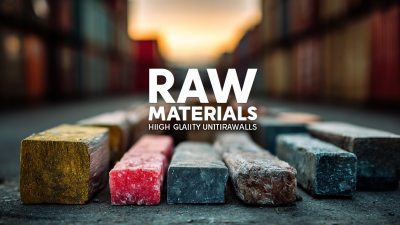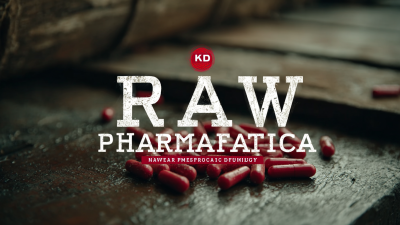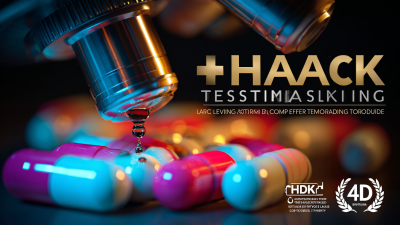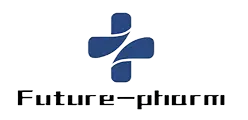
Ultimate Guide to Choosing the Right Pharmaceutical Supplier for Your Business
In the rapidly evolving pharmaceutical industry, selecting the right pharmaceutical supplier is not just a logistical consideration but a strategic imperative that can significantly impact business outcomes. According to a report by the IQVIA Institute for Human Data Science, global pharmaceutical spending is projected to surpass $1.5 trillion by 2023, highlighting the immense scale and competitive nature of the sector. As businesses navigate this landscape, the importance of partnering with reliable suppliers becomes increasingly apparent. A 2022 survey by Pharmaceutical Commerce indicated that 70% of industry leaders believe that supply chain resilience directly influences their market competitiveness. In this guide, we will explore the critical factors to consider when choosing a pharmaceutical supplier, ensuring that your business remains agile, compliant, and positioned for growth in a challenging marketplace.

Key Factors to Consider When Selecting a Pharmaceutical Supplier for Your Business
 Selecting the right pharmaceutical supplier is crucial for ensuring the quality and reliability of products. According to a report by the Pharmaceutical Research and Manufacturers of America (PhRMA), about 75% of drug products are manufactured outside the United States, highlighting the importance of thorough supplier evaluation. When considering a pharmaceutical supplier, businesses should focus on three key factors: compliance, quality assurance, and supply chain reliability.
Selecting the right pharmaceutical supplier is crucial for ensuring the quality and reliability of products. According to a report by the Pharmaceutical Research and Manufacturers of America (PhRMA), about 75% of drug products are manufactured outside the United States, highlighting the importance of thorough supplier evaluation. When considering a pharmaceutical supplier, businesses should focus on three key factors: compliance, quality assurance, and supply chain reliability.
Tip: Always verify the supplier's compliance with FDA regulations and international standards. A supplier’s adherence to Good Manufacturing Practices (GMP) not only ensures product quality but also minimizes risks associated with regulatory issues.
Quality assurance is another critical component. A recent study indicated that nearly 50% of pharmaceutical recalls are due to quality failures. Therefore, it’s essential to assess the quality control processes in place at your potential supplier.
Tip: Request detailed documentation of their quality assurance protocols and past product performance records to understand their capability in maintaining high standards.
Lastly, consider the supplier's supply chain reliability. An effective supply chain can significantly impact your business's operational efficiency. Reports suggest that companies with robust supply chain practices experience 20% lower costs and 25% faster time to market.
Tip: Evaluate the supplier’s logistics capabilities and their experience in dealing with disruptions or delays to ensure continuity of supply for your business.
Top 5 Reasons Quality Control is Critical in Pharmaceutical Supply Chains
Quality control is a cornerstone of the pharmaceutical supply chain, and its importance has only grown in the wake of global challenges. As the industry grapples with issues like medicine shortages and regulatory hurdles, maintaining high standards of quality is essential. Poor-quality active pharmaceutical ingredients (APIs) can jeopardize the safety and efficacy of medications, making it imperative for businesses to carefully vet their suppliers and ensure they adhere to stringent quality controls.
Tips for achieving robust quality control in your supply chain include implementing rigorous supplier audits and maintaining transparent communication regarding quality expectations. Regular evaluations of suppliers' processes can help identify potential risks early. Additionally, leveraging technology such as artificial intelligence can enhance monitoring capabilities, enabling more proactive quality management than ever before.
Moreover, understanding the dynamics of strategic sourcing, whether offshoring or nearshoring, plays a crucial role in mitigating risks associated with supply chain disruptions. Nearshoring can often yield quicker turnaround times and better alignment with quality standards. Establishing a clear framework for quality control not only protects your business but also fosters a reputation for reliability in the pharmaceutical market.
Understanding Regulatory Compliance: Why It Matters for Your Supplier Choice
When selecting a pharmaceutical supplier, regulatory compliance should be at the forefront of your decision-making process. Understanding the regulations set forth by agencies such as the FDA or EMA is crucial, as these guidelines are designed to ensure the safety, efficacy, and quality of pharmaceutical products. A supplier that adheres to these standards demonstrates a commitment to maintaining high-quality practices and reducing the risk of costly recalls or legal issues down the line. Partnering with a compliant supplier not only protects your business but also fosters trust with your consumers.
Furthermore, assessing your potential supplier's compliance history can provide valuable insights into their operational integrity. A supplier that transparently shares their audits, certifications, and any past compliance issues illustrates their dedication to ongoing improvement and accountability. As regulations continue to evolve, it is imperative for businesses to work with suppliers who stay informed and updated on these changes. This proactive approach allows companies to navigate the complexities of the pharmaceutical landscape more effectively, ultimately leading to a more successful partnership and healthier outcomes for patients.
Cost-Effectiveness vs. Quality: Striking the Right Balance in Supplier Selection
 When selecting a pharmaceutical supplier, businesses often face the challenge of balancing cost-effectiveness with the need for high quality. While sticking to a budget is crucial, it's essential to remember that the cheapest option may not always offer the best value. High-quality suppliers often invest in rigorous quality control processes and comply with regulatory standards that can safeguard your business against costly recalls and compliance issues.
When selecting a pharmaceutical supplier, businesses often face the challenge of balancing cost-effectiveness with the need for high quality. While sticking to a budget is crucial, it's essential to remember that the cheapest option may not always offer the best value. High-quality suppliers often invest in rigorous quality control processes and comply with regulatory standards that can safeguard your business against costly recalls and compliance issues.
Tip 1: Assess value beyond price—consider the supplier’s reputation, customer service, and their ability to meet your specific needs. Conduct thorough research to find suppliers who have a proven track record of reliability and quality in their products.
To strike the right balance, one effective strategy is to evaluate suppliers in terms of the total cost of ownership. This includes not just the purchase price, but also factors like delivery timelines, return policies, and potential risks related to product quality.
Tip 2: Implement a supplier scorecard system where you can rate potential suppliers based on critical metrics. This approach provides a clear visual representation of how suppliers stack up against each other on both cost and quality dimensions.
The Importance of Supplier Relationship Management in the Pharmaceutical Industry
In the pharmaceutical industry, supplier relationship management (SRM) plays a critical role in ensuring operational efficiency and compliance with regulatory standards. A robust SRM strategy can help businesses navigate the complexities of supply chains, enhance product quality, and manage risks effectively. According to a report by Deloitte, companies that implement effective supplier management practices can reduce costs by up to 20% and improve their overall supply chain performance. This highlights the importance of not just choosing the right supplier, but also cultivating an ongoing partnership that fosters innovation and responsiveness.
Tip: Regularly evaluate your suppliers’ performance through key performance indicators (KPIs) such as delivery times, quality metrics, and compliance rates. This ensures that you are aligned with suppliers who meet your business's high standards.
Additionally, investing in technology to facilitate communication and collaboration with suppliers can further strengthen these relationships. For instance, utilizing a cloud-based SRM platform allows for real-time data sharing and quicker response times to any issues that may arise, ultimately leading to improved outcomes. According to a report by McKinsey, companies that leverage such technologies see a 30% increase in supplier engagement and reliability.
Tip: Foster open lines of communication with suppliers to encourage transparency. Regular check-ins and feedback loops can help in addressing any concerns proactively and building a solid foundation for a long-term partnership.
Related Posts
-

Navigating the Landscape of Best Pharmaceutical Supplier Choices for Your Business
-

Strategies for Sourcing Premium Raw Materials Globally
-

Exploring the Future of Best High Quality Raw Materials in 2025 for Global Buyers
-

Emerging Drug Raw Material Technologies Shaping the Pharmaceutical Landscape by 2025
-

Unveiling the Specifications of the Best Raw Pharmaceutical: A Comprehensive Sourcing Guide for Global Buyers
-

Evaluating Leading Pharmaceutical Testing Providers: A Comprehensive Comparison Guide
